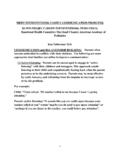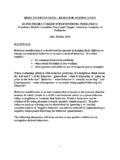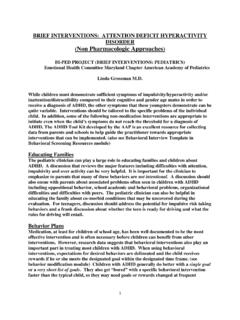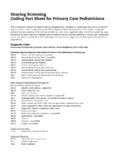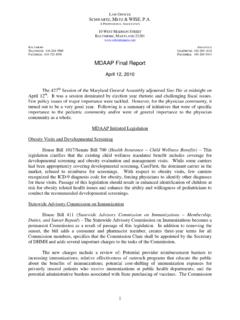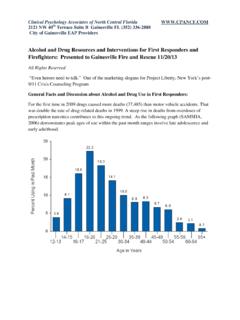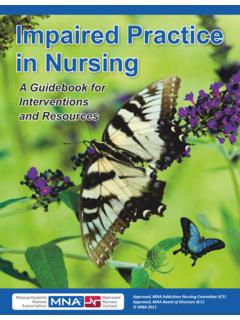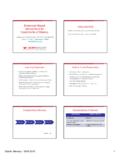Transcription of BRIEF INTERVENTIONS: ATTENTION DEFICIT HYPERACTIVITY ...
1 1 BRIEF interventions : ATTENTION DEFICIT HYPERACTIVITY DISORDER (Non Pharmacologic Approaches) BI-PED PROJECT ( BRIEF interventions : PEDIATRICS) Emotional Health Committee Maryland Chapter American Academy of Pediatrics Linda Grossman While children must demonstrate sufficient symptoms of impulsivity/ HYPERACTIVITY and/or inattention/distractibility compared to their cognitive and gender age mates in order to receive a diagnosis of ADHD, the other symptoms that these youngsters demonstrate can be quite variable.
2 interventions should be tailored to the specific problems of the individual child. In addition, some of the following non-medication interventions are appropriate to initiate even when the child s symptoms do not reach the threshold for a diagnosis of ADHD. The ADHD Tool Kit developed by the AAP is an excellent resource for collecting data from parents and schools to help guide the practitioner towards appropriate interventions that can be implemented. (also see Behavioral Interview Template in Behavioral Screening Resources module) Educating Families The pediatric clinician can play a large role in educating families and children about ADHD.
3 A discussion that reviews the major features including difficulties with ATTENTION , impulsivity and over activity can be very helpful. It is important for the clinician to emphasize to parents that many of these behaviors are not intentional. A discussion should also ensue with parents about associated problems often seen in children with ADHD including oppositional behavior, school academic and behavioral problems, organizational difficulties and difficulties with peers. The pediatric clinician can also be helpful in educating the family about co-morbid conditions that may be uncovered during the evaluation.
4 For teenagers, discussion should address the potential for impulsive risk taking behaviors and a frank discussion about whether the teen is ready for driving and what the rules for driving will entail. Behavior Plans Medication, at least for children of school age, has been well documented to be the most effective intervention and is often necessary before children can benefit from other interventions . However, research data suggests that behavioral interventions also play an important part in treating most children with ADHD.
5 When using behavioral interventions , expectations for desired behaviors are delineated and the child receives rewards if he or she meets the designated goal within the designated time frame. (see behavior modification module) Children with ADHD generally do better with a single goal or a very short list of goals. They also get bored with a specific behavioral intervention faster than the typical child, so they may need goals or rewards changed at frequent 2 intervals. To be successful, a behavioral intervention must be created so that the child obtains the reward at least 75% of the time.
6 Otherwise he may not buy into the plan. When a behavioral plan is not working: Make sure the goals are realistic and matched to the child s abilities. Check to see how often the plan enables the child to earn points. If it is too difficult to earn points, the plan will not work. The number of points or stickers required to earn rewards may need to be reduced so that the child experiences success. Make sure that rewards are still motivating to the child and be prepared to change them if necessary.
7 Many children with ADHD need frequent reinforcement to change behavior and therefore may need rewards at the end of each half day in addition to receiving a larger award at the end of the week. interventions should be tailored to the child s specific needs and problems such as those listed below: 1. Overactivity Children with ADHD often have a hard time sitting still and need to move around more than the typical child. If this is a problem for the child consider the following strategies: Provide lots of opportunities for activity.
8 Make sure that the child can be active after school. After a long day of sitting in school, he may need to release some energy before he can begin to tackle homework or engage in family activities. Be reasonable with expectations. Don t put him in situations where he needs to sit quietly too long or where his activity level is likely to get him in trouble. For instance, many children with ADHD can handle a 15 minute grocery store trip but go wild on an hour-long trip. It may work better to schedule several short trips or to arrange for someone to watch the child while the parent makes a longer trip.
9 Be sensitive to his need for movement. Also anticipate when his limit is approaching and remove him to someplace where he can be active without being disruptive. Consider enrolling him in sports. Most children with ADHD do best with sports where they can be moving most of the time. Generally swimming, soccer, and martial arts work out better than sports like baseball (where there is a lot of stranding around time and a need for the child to pay ATTENTION and respond to the game). Make sure the coach or instructor knows about the child s problems so that they can be sensitive to the child s needs and remain positive with the child whenever possible.
10 2. ATTENTION problems Another large group of youngsters with ADHD have trouble sustaining ATTENTION . If a short ATTENTION span is an issue, consider the following: Get the child s ATTENTION first, then ask the question or give the directive 3 Ask the child to repeat back what he is supposed to do. Often when the child puts it into his own words, he can remember it longer. This can be a useful strategy when taking the child to a store. The parent can review the rules ( stay with me) and ask the child to repeat back the expected behavior.
